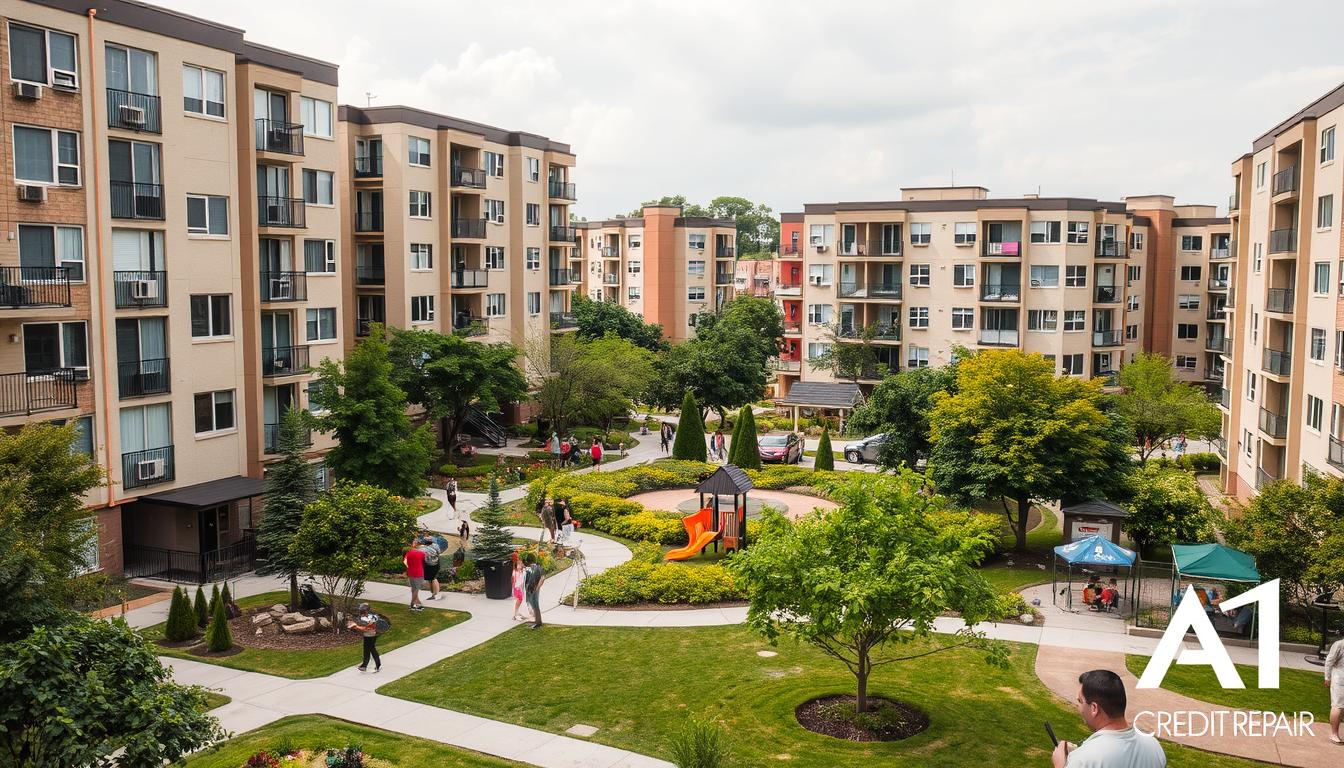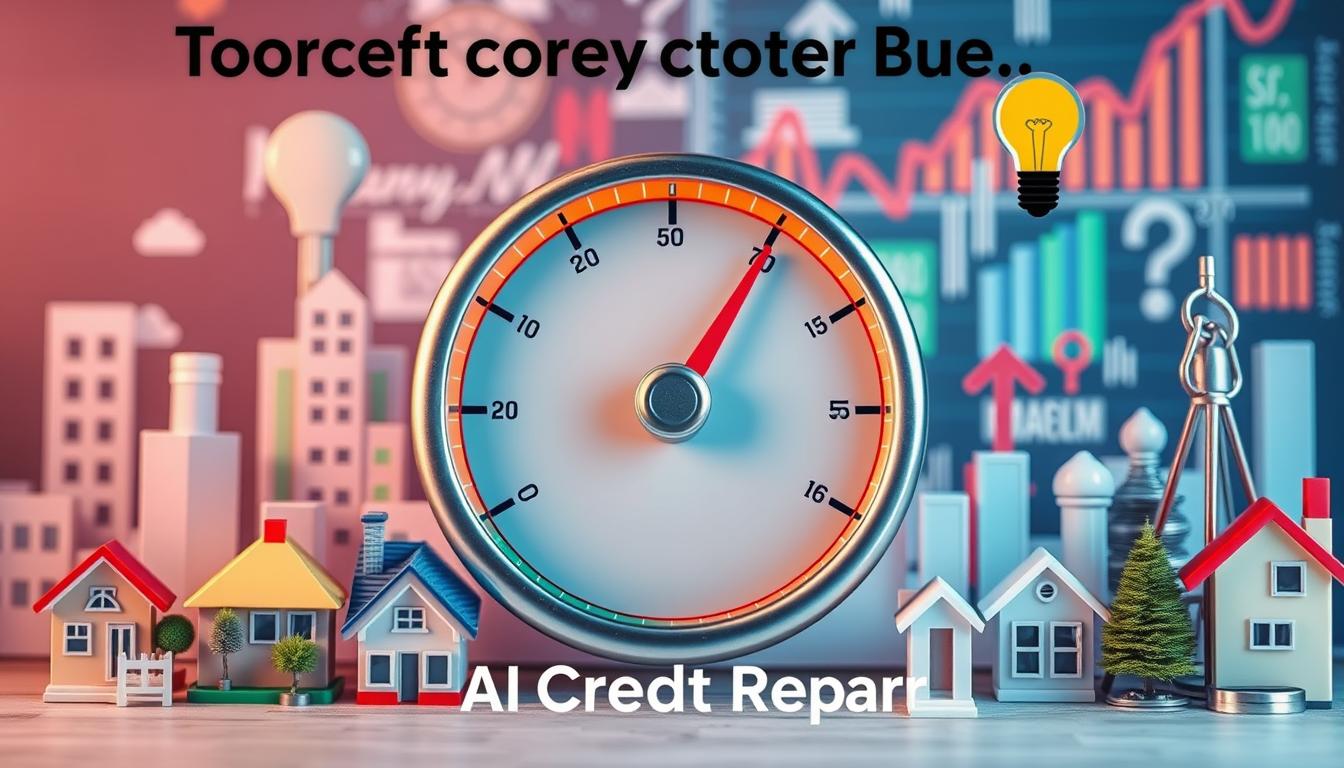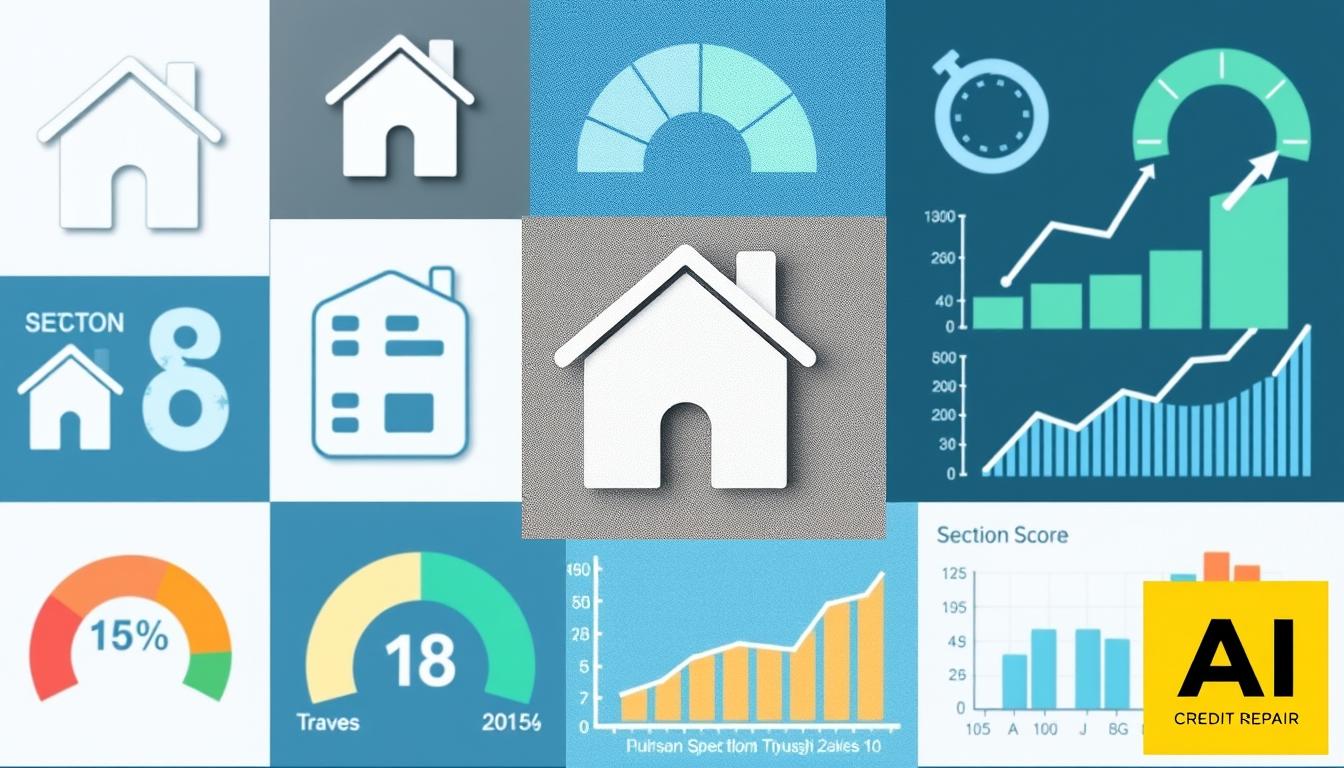The Section 8 Housing Choice Voucher Program helps low-income individuals and families find affordable housing. This program is offered by the U.S. Department of Housing and Urban Development (HUD).
We’ll explore Section 8 credit score requirements and eligibility criteria. We’ll also discuss the importance of credit scores in this program.
Finally, we’ll share strategies to improve your financial standing. These tips can help you access this valuable housing assistance program.
Key Takeaways
- Understanding the Section 8 housing program and its eligibility requirements
- Importance of credit scores in the Section 8 application process
- Minimum credit score needed to qualify for Section 8 housing
- Factors that influence credit score evaluation for Section 8 applicants
- Strategies to boost your credit score and improve your chances of approval
Understanding Section 8 Housing
Section 8 housing helps low-income families, elderly, and disabled individuals afford quality homes. This federal program offers rental assistance to eligible participants in their communities.
What is Section 8 Housing?
The Section 8 program provides two types of rental assistance: tenant-based and project-based. Tenant-based allows recipients to choose private market housing. Project-based is tied to specific housing developments.
The program covers 30% to 40% of the household’s adjusted monthly income for rent. This helps make housing more affordable for those in need.
Eligibility Criteria for Section 8 Housing
To qualify for Section 8 housing, applicants must meet specific requirements. These include income limits set by the U.S. Department of Housing and Urban Development (HUD).
- Meeting income limits set by the U.S. Department of Housing and Urban Development (HUD)
- Being a U.S. citizen or eligible non-citizen
- Having a household size that is appropriate for the available unit
- Passing a background check and credit check
Eligibility criteria may vary by local housing authority. Applicants should check requirements in their area for accurate information.

Section 8 housing offers crucial support to those struggling with housing costs. It helps eligible individuals and families access affordable homes in their communities.
The Importance of Credit Scores
Your credit score is vital for securing housing, including Section 8 assistance. This number reflects your creditworthiness. Landlords use it to assess your ability to pay rent on time.
Credit scores are key in rental applications. A poor credit history can hurt your chances of renting, even with Section 8 eligibility. A strong score improves your prospects for affordable housing.
Your credit score affects rental agreement terms. Good credit may lead to better rates and fewer upfront costs. Renting with poor credit can result in stricter terms or application denial.
Managing your credit is crucial for Section 8 seekers. A healthy credit profile increases your chances of finding suitable housing. It can open doors to more affordable options.
Your credit score is the gatekeeper to housing opportunities, and it’s crucial to manage it responsibly if you want to access the best rental options, including Section 8 housing.
The Impact of Credit History on Housing
Credit history greatly affects your credit score. Landlords examine your payment history, debts, and credit use. Late payments, high balances, or collections can harm your rental chances, even with Section 8.
| Credit Score Range | Housing Impact |
|---|---|
| 800-850 | Excellent credit, higher chances of securing rental housing and favorable terms |
| 700-799 | Good credit, increased opportunities for rental housing and negotiable terms |
| 600-699 | Fair credit, potential challenges in renting and higher upfront costs |
| 500-599 | Poor credit, significant barriers to renting and limited housing options |
| 499 or below | Very poor credit, high risk of rental application denial or additional requirements |
Your credit score directly impacts your rental options, including Section 8 housing. A strong credit profile is key to finding affordable, suitable living spaces. Maintain good credit to improve your housing prospects.

What Credit Score Do You Need for Section 8 Housing?
Your credit score is vital for Section 8 housing eligibility. Local housing authorities set specific minimum credit score requirements for this federal rental assistance program.
Minimum Credit Score Requirements
Section 8 credit score requirements vary by local housing authority. Some may accept scores as low as 500, while others demand 600 or higher.
Check with your local housing authority to learn their specific credit score requirements. This will help you understand your eligibility better.
Factors Affecting Credit Score Evaluation
Housing authorities look beyond your overall credit score. They consider various aspects of your credit history when making decisions.
- Payment history: Your track record of making on-time payments for bills, loans, and credit cards.
- Credit utilization: The amount of credit you’re using compared to your total available credit.
- Length of credit history: The duration of your credit history, including the age of your oldest and newest accounts.
- Types of credit: The mix of credit accounts you have, such as credit cards, loans, and mortgages.
- Recent credit inquiries: The number of times your credit has been checked, which can impact your score.
Understanding these factors can help you improve your credit score. This can boost your chances of qualifying for Section 8 housing.

| Credit Factor | Impact on Section 8 Eligibility |
|---|---|
| Payment History | Consistent on-time payments demonstrate responsible credit management and can boost your chances of approval. |
| Credit Utilization | Maintaining a low credit utilization ratio (below 30%) shows you’re not overextended and can improve your credit score. |
| Credit History Length | A longer credit history with established accounts can positively influence your credit score and Section 8 eligibility. |
The section 8 minimum credit score and credit factors for section 8 eligibility can vary. Always check with your local housing authority.
They can provide specific credit requirements for low-income housing in your area. This information is crucial for your application process.
Improving Your Credit Score
Is your credit score too low for Section 8 housing? Don’t worry! We’ll show you how to boost it. These steps will help you build a stronger credit profile. You’ll be on your way to achieving your housing goals.
Strategies to Boost Your Credit Score
You can improve your credit score for Section 8 housing with good financial habits. Here are some effective strategies to try:
- Monitor your credit report regularly and dispute any errors or inaccuracies. This helps you spot and fix issues that may lower your score.
- Pay your bills on time, every time. Payment history is crucial for your credit score. Set up automatic payments or reminders to avoid missing due dates.
- Reduce your credit card balances. Keep your credit utilization below 30% to show responsible credit management.
- Become an authorized user on someone else’s credit card with a good history. This can help build your credit history and boost your score.
- Consider a secured credit card if you have limited credit history. These require a deposit, which becomes your credit limit.
Use these credit repair tips for low-income housing to improve your chances. They’ll help you build credit for rental assistance. Follow these steps to how to improve credit score for section 8.
“Improving your credit score is a journey, not a destination. With patience and consistent effort, you can overcome credit challenges and achieve your housing goals.”
Section 8 Credit Score
Your credit score is vital for Section 8 housing. Landlords and housing authorities examine typical section 8 credit scores to assess eligibility. They want to ensure applicants can maintain rental payments.
Studies show the average credit score for low-income housing applicants ranges from 600 to 680. This range typically meets Section 8 requirements. It shows responsible financial history and manageable debt-to-income ratio.
The credit score range for rental assistance can vary by housing authority and landlord. Some may be more flexible, while others have stricter rules. Each case is unique.
Don’t worry if your score is below average. You can improve it to boost your Section 8 chances. Take steps to build a strong credit profile.
Building a good credit score is essential for accessing affordable housing options like Section 8. It’s a journey, but with the right strategies, you can achieve the credit score needed to secure the housing assistance you deserve.”

The Application Process
Understanding the section 8 application process is vital for securing affordable housing assistance. Knowing the required documents needed for section 8 housing and information required for rental assistance is crucial.
Required Documents and Information
When applying for section 8 housing, you’ll need to provide specific documents and personal details. These include proof of identity and income.
You’ll also need to share information about your current living situation and household members. Details about any disabilities or special needs are important too.
- Proof of identity, such as a government-issued ID or birth certificate
- Proof of income, including recent pay stubs, Social Security statements, or other financial documents
- Information about your current living situation, such as your address, rent, and utility costs
- A list of all household members, including their ages and relationship to you
- Details about any disability or special needs that may impact your housing requirements
You may need to submit documents about your credit history, criminal background, and immigration status. These requirements can vary based on your local housing authority.
Organizing these documents needed for section 8 housing can help speed up the process. It can also boost your chances of getting the assistance you need.
“The key to a successful section 8 application is being prepared and providing all the necessary information upfront. This helps the housing authority process your request efficiently and increases the likelihood of a positive outcome.”
Appealing Credit Score Decisions
Don’t give up if your Section 8 housing application is denied due to credit issues. You can appeal the decision and dispute any errors in your credit report. With the right steps, you might overturn the rejection and secure housing assistance.
Start by getting your credit report from Experian, Equifax, and TransUnion. Look for mistakes like wrong account info, missed payments, or incorrect personal details. If you find errors, start a formal dispute with the credit bureaus.
- Gather supporting documentation: Collect any evidence that can help substantiate your dispute, such as payment receipts, bank statements, or correspondence with creditors.
- Submit the dispute: Contact the credit bureaus and follow their specific dispute process, which may involve submitting your dispute online, by mail, or over the phone.
- Monitor the progress: Keep track of the dispute’s status and follow up with the credit bureaus if the issue is not resolved within the allotted time frame.
If the credit bureaus fix the errors, reapply for Section 8 housing with your updated info. This process can be key to overturning a credit-based denial.
| Step | Action |
|---|---|
| 1 | Obtain a copy of your credit report |
| 2 | Review the report for errors |
| 3 | Gather supporting documentation |
| 4 | Submit a formal dispute to the credit bureaus |
| 5 | Monitor the progress of the dispute |
| 6 | Reapply for Section 8 housing with updated credit information |
Challenging credit-based denials is vital when appealing section 8 credit score rejection. Follow the right steps and provide solid evidence. This can boost your chances of getting the housing help you need.
Maintaining Good Credit
Getting Section 8 housing is just the beginning. Good credit is key to keeping your rental assistance. Follow these tips to manage your credit and secure your Section 8 status.
Tips for Responsible Credit Management
Paying bills on time is crucial for good credit. Set up automatic payments or reminders to avoid late fees. Check your credit report often to spot and fix any errors.
Keep your credit card balances below 30% of your limit. This shows lenders you’re a responsible borrower. It also helps maintain a healthy credit utilization ratio.
Having different types of credit can boost your score. Mix it up with credit cards, loans, and mortgages. This proves you can handle various credit types well.

